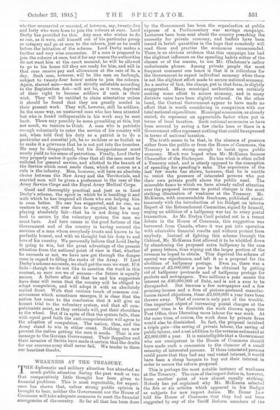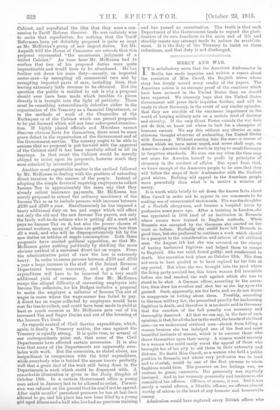WEAKNESS AT THE TREASURY. T HE diplomatic and military situation has
absorbed so much public attention during the past week or two that comparatively little thought has been given to financial problems. This is most regrettable, for experi- ence has shown that, unless strong public opinion is brought to bear, neither the Government nor the House of Commons will take adequate measures to meet the financial emergencies of the country. So far all that has been done by the Government has been the organization at public expense of a Parliamentary war savings campaign, Lecturers have been sent about the country preaching the necessity for private economy, and leaflets have been issued in lavish quantities in the hope that somebody will read them and practise the economies recommended. There is no obvious evidence that this campaign has bad the slightest influence on the spending habits either of the classes or of the masses, to use Mr. Gladstone's rather unfortunate phrase. Among private people the most frequent comment one hears is that it is ridiculous for the Government to expect individual economy when there is not the slightest effort made to secure national economy. As a matter of fact, the charge, put in that form, is slightly exaggerated. Many municipal authorities are certainly making some effort to secure economy, and in many districts rates have been slightly reduced. On the other hand, the Central Government appear to have made no effort that is worth considering in comparison with our total national expenditure. Municipal economies, as already stated, do represent an appreciable factor when put in terms of local taxation. Such national economies as have been secured by saving a few clerks here or there in a Government office represent nothing that could be expressed in terms of national taxation.
The truth seems to be that, in the absence of pressure either from the public or from the House of Commons, the Treasury is not strong enough to insist upon. public economy. Much was hoped when Mr. McKenna became Chancellor of the Exchequer. He has what is often called a Treasury mind, and is utterly opposed to the conception of spending for spending's sake. The experience of the last few weeks has shown, however, that he is unable to resist the pressure of interested persons who put their own private profit above the public need. The miserable fiasco to which we have already called attention over the proposed increase in postal charges is the most striking illustration of weakness at the Treasury. Mr. McKenna, with commendable frankness, published simul- taneously with the introduction of his Budget an interim Report of the Retrenchment Committee, signed by himself, urging an addition of a halfpenny war tax to every postal transaction. As Mr. Evelyn Cecil pointed out in a recent debate in the House of Commons, this suggestion was borrowed from Canada, where it was put into operation with admirable financial results and without protest from anybody. Instead of fighting this scheme through the Cabinet, Mr. McKenna first allowed it to be whittled down by abandoning the proposed extra halfpenny in the case of penny letters, thus wiping out the larger portion of the revenue he hoped to obtain. This deprived the scheme of special war significance, and left it as a proposal for the abolition of halfpenny postage. Even so, there was a revenue of £2,000,000 a year to be obtained by getting rid of halfpenny postcards and of halfpenny postage for packets and newspapers. Two millions a year means the interest on £40,000,000 of Debt, and is not a sum to be disregarded. But because a few newspapers and a few printing-houses and a firm of picture-postcard manufac. turers raised objections, these £2,000,000 a year have been thrown away. That of course is only part of the trouble. One important object of increasing postal charges at the present time is to diminish the work thrown upon the Post Office, thus liberating more labour for war work. At the same time, of course, the work done by private firms would also be diminished. In fact, the proposal involved a triple gain—the saving of private labour, the saving of public labour, and a net addition to the revenue estimated at £2,000,000 a year. It is unintelligible that a, Government who are omnipotent in the House of Commons should have made such a concession to the clamour of a small minority of interested persons. If these interestedit would i could prove that they had any real vested interest, t would have been a cheap bargain to buy out their interest in order to secure the reform proposed.
This is perhaps the most notable instance of weakness at the Treasury. The case of the import duties is, however, from another point of view almost equally striking. Nobody has yet explained why Mr. McKenna selected the five or six articles which appeared in his Budget as subjects for new import duties. Mr. Boner Law told the House of Commons that they had not been suggested by any of the Tariff Reform members of the Cabinet, and repudiated the idea that they were a con- cession to Tariff Reform theories. He was certainly wise to make that repudiation, for nothing that the Tariff Reformers have yet definitely proposed is quite so inept as Mr. McKenna's group of now import duties. Yet Mr. Asquith told the House of Commons ore rotundo that this proposal represented "the unanimous judgment of a united Cabinet." An hour later Mr. McKenna had to confess that two of his proposed duties were quite impracticable and would have to be abandoned. He has further cut down his main duty—namely, on imported motor-cars—by exempting all commercial cars and by exempting imported parts of cars, including tiros, thus leaving extremely little revenue to be obtained. But the question the public is entitled to ask is why a proposal should ever have been made which tumbles to pieces directly it is brought into the light of publicity. There must be something extraordinarily defective either in the organization of the Treasury as a financial Department, or in the methods of work of the Chancellor of the Exchequer or of the Cabinet which can permit proposals to be put forward which will not bear subsequent examina- tion. If highly placed officials and Ministers cannot discover obvious facts for themselves, there must be some grave defect in the organization of the Government and of the Government service. The country ought to be able to assume that no proposal is put forward with the approval of the Cabinet until it has been carefully sifted in all its bearings. In that event the Cabinet would be morally obliged to insist upon its proposals, however much they were attacked by interested parties.
Another most regrettable matter is the method followed by Mr. McKenna in dealing with the problem of extending direct taxation to the masses of the people. Instead of adopting the simple device of requiring employers to collect Income Tax in approximately the same way that they already collect insurance payments, Mr. McKenna has merely proposed to extend the ordinary machinery of the Income Tax so a■ to include persons with incomes between £130 and £160 a year. Simultaneously he has imposed a heavy additional duty on tea and sugar which will affect not only the old and the new Income Tax payers, not only the fairly well-to-do artisan who is getting £2 a week and pays no Income Tax on it, but also the poorer classes of manual workers, many of whom are getting even less than £1 a week, and who will be disproportionately hit by the new duties on articles of staple consumption. Both these proposals have excited political opposition, so that Mr. McKenna gains nothing politically by shirking the more obvious method of a universal direct tax on wages. From the administrative point of view the loss is extremely heavy. In order to assess persons between £130 and £160 a year a large increase in the staff of the Inland Revenue Department becomes necessary, and a great deal of expenditure will have to be incurred for a very small additional yield of revenue. Nor does Mr. McKenna escape the alleged difficulty of converting employers into Income Tax collectors, for his Budget includes a proposal to make the employer a collector of Income Tax out of wages in cases where the wage-earner has failed to pay. A direct tax on wages collected by employers would have cost far less to collect, and could have been made to yield at least as much revenue as Mr. McKenna gets out of his increased Tea and Sugar Duties and out of the lowering of the Income Tax limit.
As regards control of Civil Service expenditure, which, again, is finally a Treasury matter, the case against the Treasury is equally strong. It is quite true, as several of our correspondents point out, that some of the Civil Departments have effected certain economies. It is also true that many of the Departments are apparently over- laden with work. But the economies, as stated above, are insignificant in. comparison with the total expenditure, while everybody who is behind the scenes knows perfectly well that a great deal of the work still being done in the Departments is work which could be dispensed with. A remarkable illustration is given in the Daily Graphic of October 19th. In a certain Government office a young man asked in jemmy last to be allowed to enlist. Permis- sion was refused on the ground that he could not be spared. After eight months' persistent pressure he has at last been allowed to go, and his place has now been filled by a young girl aged fifteen and a half who has had no previous training and has passed no examination. The truth is that each Department of the Government tends to regard the glori- fication of its own functions as the main eud of life and steadily resists any attempt made to reduce its establish- ment. It is the duty of the Treasury to insist on those reductions, and that duty is not discharged.







































 Previous page
Previous page